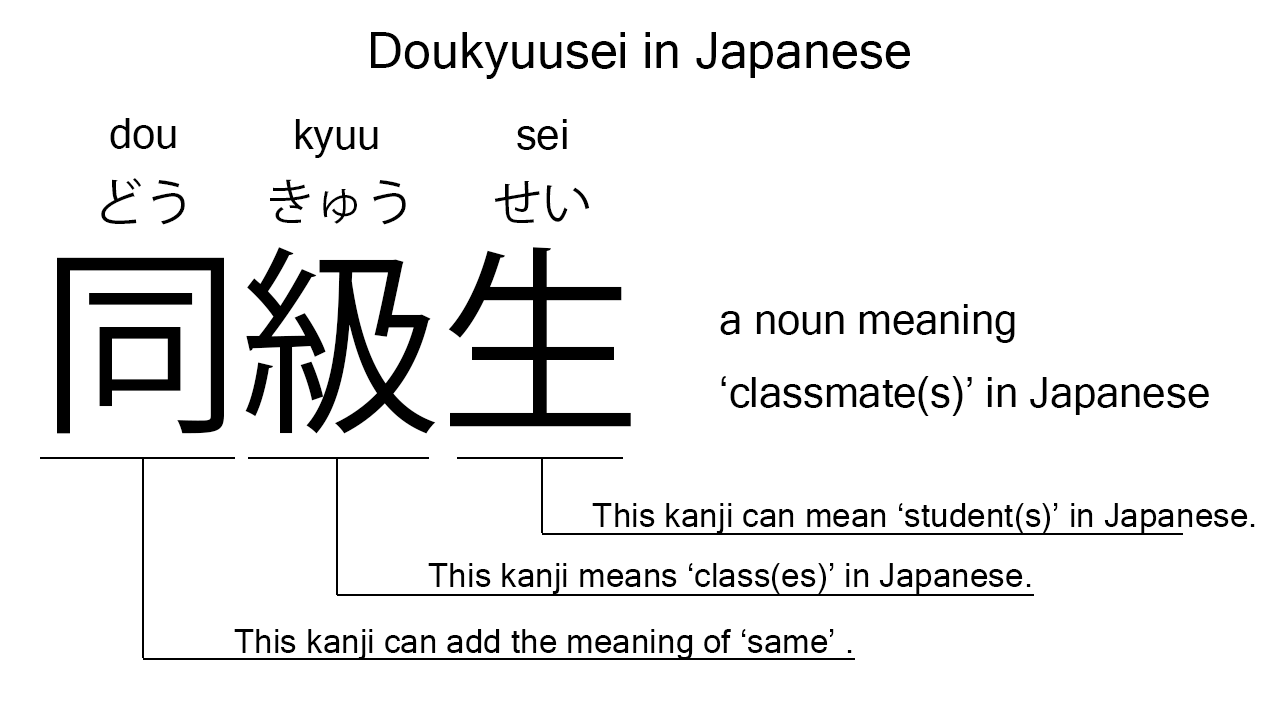What does “doukyuusei” mean in Japanese?
Native speakers say “doukyuusei” to mean ‘classmate’ in Japanese. Perhaps, some Japanese learners know this word as it is sometimes used in Japanese textbooks. In this blog post, however, I will explain it in detail based on its kanji expression. And also, I will explain how to use it through example sentences. My explanations would help Japanese learners understand “doukyuusei” more clearly. Then, let’s get started!
Contents
Definition and meaning of “doukyuusei”
Let me start with the definition and meaning of “doukyuusei”.
- doukyuusei – 同級生 (どうきゅうせい) : a noun meaning ‘classmate’ in Japanese. This can also work as plural. Learn more about Japanese plural.
The definition and meaning are simple and clear. To understand this noun more clearly, however, let me explain its kanji characters in detail, one by one.
Doukyuusei in kanji
The kanji expression of “doukyuusei” consists of the following three kanji characters:
- 同 : a kanji character often used as a prefix to add the meaning of ‘same’.
- 級 : a kanji character used to mean a ‘class’ in Japanese.
- 生 : a kanji character considered as the shortened version of “seito” which means a ‘student’ in Japanese.
These three kanji characters tell us that the formed noun literally means a ‘same class student’ in Japanese. This literal interpretation is very close to the actual meaning. Classmates are often students in the same class.

When we meet new kanji expressions, we should check their kanji characters in detail to understand their meanings clearly and deeply. In many cases, kanji characters tell us a lot about the meanings of the expressions they form. Actually, here, we could get the better understanding of “doukyuusei” through the detailed kanji check above.
So far, I’ve explained the definition and meaning of “doukyuusei” together with its kanji characters. Then, let me explain how to use it through the example sentences below.
Example #1: how to say “classmate” in Japanese
kanojo wa boku no doukyuusei desu – 彼女は僕の同級生です (かのじょはぼくのどうきゅうせいです)
She is my classmate.
Below are the new words used in the example sentence.
- kanojo – 彼女 (かのじょ) : a pronoun meaning ‘she’ in Japanese.
- wa – は : a binding particle working as a case marker or topic marker. In the example, this works after “kanojo” to make the subject in the sentence.
- boku – 僕 (ぼく) : a pronoun meaning ‘I’ in Japanese. This is used mainly by boys and young males.
- no – の : a case particle used after a noun or pronoun to make its possessive case. In the example, this is used after “boku” to make its possessive case, “boku no”, which means ‘my’ in Japanese.
- desu – です : an auxiliary verb used after a noun or adjective to make it polite. Probably, this is well known as a part of Japanese desu form. In the example, this is used after the noun phrase, “boku no doukyuusei”, to make it sound polite.
This is a typical usage of “doukyuusei”. In this example, it works together with “boku no” to mean ‘my classmate’ in Japanese.
Example #2: another usage of “doukyuusei”
ano otokonoko wa watashi no imouto no doukyuusei desu – あの男の子は私の妹の同級生です (あのおとこのこはわたしのいもうとのどうきゅうせいです)
That boy is my little sister’s classmate.
Below are the new words used in the example sentence.
- ano – あの : a determiner used before a noun referring to a thing not close to the speaker. In the example, this is used before “otokonoko” to mean ‘that boy’ in Japanese.
- otokonoko – 男の子 (おとこのこ) : a noun meaning ‘boy’ in Japanese. This can also work as plural.
- watashi – 私 (わたし) : a pronoun meaning ‘I’ in Japanese. In the example, this works together with “no” to mean ‘my’ in Japanese.
- imouto – 妹 (いもうと) : a noun meaning ‘little sister’ in Japanese. This can also work as plural. In the example, this works together with “no” to mean “little sister’s” in Japanese.
This is another typical usage of “doukyuusei”. In this example, it works as a part of the noun phrase, “watashi no imouto no doukyuusei”, which means “my little sister’s classmate” in Japanese. When we want to mean a ‘classmate’ in Japanese, anyway, this noun is always a very good option.
Summary
In this blog post, I’ve explained the definition and meaning of “doukyuusei” in detail based on its kanji expression. And also, I’ve explained how to use it through the example sentences. Let me summarize them as follows.
- doukyuusei – 同級生 (どうきゅうせい) : a noun meaning ‘classmate’ in Japanese. This can also work as plural. These three kanji characters literally mean a ‘same class student’ in Japanese. This literal interpretation is very close to the actual meaning. Classmates are often students in the same class.
Hope my explanations are understandable and helpful for Japanese learners.